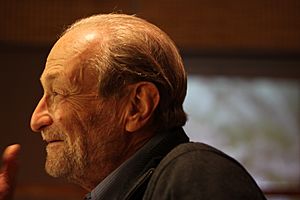Jacques Mehler facts for kids
Quick facts for kids
Jacques Mehler
|
|
|---|---|
 |
|
| Born | August 17, 1936 |
| Died | February 11, 2020 (aged 83) |
| Alma mater | Harvard University |
| Scientific career | |
| Fields | Cognitive neuroscience |
| Thesis | How some sentences are remembered (1964) |
| Academic advisors | George Armitage Miller |
Jacques Mehler (born August 17, 1936 – died February 11, 2020) was a smart scientist who studied how our brains learn and understand language. He was a cognitive psychologist, which means he looked at how people think, learn, and remember things.
Contents
Education
Jacques Mehler was a very educated person! He first studied chemistry at the University of Buenos Aires from 1952 to 1958. After that, he went to University of Oxford and University College London in 1959. There, he earned another degree in science.
From 1961 to 1964, he studied at Harvard University in the United States. This was a time when the study of the mind was changing a lot, called the cognitive revolution. At Harvard, he worked with a famous professor named George Armitage Miller. Jacques Mehler earned his PhD in Psychology there.
Career and Achievements
Jacques Mehler held important positions throughout his career. He was a professor at the École des Hautes Études en Sciences Sociales in France. There, he led a special lab that studied how people think and use language.
He also headed the Language, Cognition and Development lab at a school in Italy called the International School for Advanced Studies (SISSA). In 1982, he joined the Scientific Council of the Max Planck Institute for Psycholinguistics. This is a big research center in Germany.
Mehler was also the main editor of a science magazine called Cognition until 2007. His work was recognized by many important groups. In 2001, he became an honorary member of the American Academy of Arts and Sciences. In 2003, he was named a Fellow of the American Association for the Advancement of Science. In 2009, he became an international member of the American Philosophical Society.
Understanding Language and the Brain
Jacques Mehler spent most of his life studying how we learn and process language. He wanted to know how our brains handle words, sentences, and sounds.
Babies and Language Learning
Early in his career, Mehler and his team made an exciting discovery. They found that even two-year-old children have amazing thinking skills that weren't known before. Their research helped change how scientists thought about how children learn. Instead of just learning from their surroundings, it seemed that babies are born with some abilities already in place.
While working in France, he set up a lab at a hospital to study newborn babies. These studies helped scientists understand how babies start to learn language. For example, they found that newborns can:
- Recognize their mother's voice.
- Hear speech as a series of sounds, like syllables.
- Tell the difference between words with two syllables and words with three syllables.
- Understand the rhythm of speech.
These findings were very important for understanding how language learning begins. They showed that babies are ready to learn language from the moment they are born.
Brain Imaging and Language
Mehler and his students also used special machines to look at the brain. These machines included PET, MRI, and Near-Infrared Spectroscopy. They wanted to see which parts of the brain are active when we process language.
One of their first discoveries was that newborns' brains respond differently to normal speech compared to speech played backward. The left side of the brain showed more activity when hearing normal speech. This suggested that the left side of the brain is important for language even in tiny babies.
Research in Italy
In 2001, Jacques Mehler moved to Italy and started a new lab called the Language, Cognition and Development (LCD) laboratory. He continued to study how the mind and brain develop in young children. He even helped set up a special unit at a hospital to test newborns.
His group in Italy became interested in how babies learn patterns from sounds and words. They also studied how the prosody of speech helps language learning. Prosody is like the music of speech, including its rhythm and intonation. Jacques and his team showed that these musical parts of speech help babies figure out where words begin and end.
Vowels, Consonants, and Bilingual Brains
Along with his colleague Marina Nespor, Mehler also suggested that vowels and consonants play different roles in how we process language. This idea led to many new studies that showed how important both types of sounds are, even for infants.
Jacques Mehler and his team also explored other interesting topics. They studied how adults process speech, how we learn math, how we understand music, and how our brains make decisions. For example, they found that seven-month-old babies who grow up with two languages have better thinking skills than babies who only learn one language. This shows that being bilingual can give kids a cognitive boost!
 | Dorothy Vaughan |
 | Charles Henry Turner |
 | Hildrus Poindexter |
 | Henry Cecil McBay |

